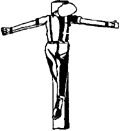PROPHET |
|
| Jeremiah
28:9: "But the prophet who prophecies peace will
be recognized as one truly sent from the Lord only if his prediction comes true." Lamentations 2:14: "The visions of your prophets were false and worthless; they did not expose your sin to ward off your captivity. The oracles they gave you were false and misleading." Titus 1:12-13: "Even one of their own prophets has said, 'Cretans are always liars, evil brutes, lazy gluttons.' This testimony is true. Therefore, rebuke them sharply, so that they will be sound in faith." |
| Are
poets prophets? Prophets in the biblical sense are spokespersons for God. Like the prophets Deborah and Ezekiel, they are divinely commanded to deliver God's message to his people, a message that is often a call to repent and to turn back to God. It is not uncommon for the authors of creative fiction and poetry to be referred to as prophets. Those who do tend to do so either because the writer has great insight into the human condition or speaks out against social and political injustice. The more radical (and esoteric) version of this claims that literary artists are prophets by virtue of being creative alone, that the very act of writing a poem or story is a kind of prophecy in that it offers something of the human spirit that cannot be reduced to the deterministic or mundane. There are dangers in too easily applying this label to many (or even every) creative artist. Not every one is divinely commanded of God in quite the same way that a biblical prophet is. While artists may be gifted of God to make beautiful objects, it doesn't always follow that they are speaking for God. Of course, some, like the prophet Isaiah, are both voices of God and talented in their presentation. Paul, quoting a portion of the famous poem Hymn to Zeus, called the Cretan poet-philosopher Epimenides a "prophet" in part because the Cretan people highly honored him and in part because his condemnation of his culture's ethical abuses supported Titus' need for enforcing church discipline. It is likely, Paul did not intend the title "prophet" to have the same force as when referring to Jeremiah or Hilduh. Rather, Epimendes is prophetic in the more general sense that his words reflect God's perspective on a matter, even if not directly inspired. In this sense then, we might comfortably refer to some authors as having a prophetic sense or disposition. * * * * * Central Insight: Some literature may be understood as "prophetic" in a limited, ethical sense only. Suggestions for Application: Discuss the particular ethical insights of an author and their impact on social issues. Alternatively, show why an author's claim for his or her artisitic expression as "prophetic" is misguided. |
